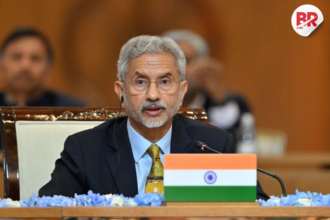
Nuclear Threat: Pakistan’s Reckless Escalation Over the Indus Waters Treaty
The relationship between India and Pakistan has always been a volatile one, but recently, a Pakistani minister’s threat of nuclear retaliation has pushed it to new extremes.
This came after discussions within India regarding the Indus Waters Treaty—a 1960 agreement that allocates the Indus River’s waters between the two countries. So, what’s the issue? Well, it’s all about water, but now, apparently, it’s about nukes too.

The Indus Waters Treaty: A Lifeline or a Liability?
To understand the weight of the threat, we need to know a bit about the Indus Waters Treaty. Brokered by the World Bank in 1960, the treaty divides the waters of the Indus River system between India and Pakistan. India controls the Beas, Ravi, and Sutlej rivers, while Pakistan oversees the Indus, Chenab, and Jhelum rivers.
A permanent commission manages the flow of these waters. For decades, the treaty has managed to survive multiple wars and tensions. But now, some voices within India are calling for changes to this agreement.
These discussions center on whether the treaty still makes sense, given the increasing water scarcity in India and the demands for more hydropower and irrigation.
So far, nothing concrete has come from these discussions, but the mere idea of modifying the treaty seems to have set off alarm bells across the border in Pakistan.
Pakistan’s Railway Minister Hanif Abbasi:
“Our nuclear missiles aren’t decoration. They were made for India”
🇮🇳🇵🇰 pic.twitter.com/VR5PUnn5Uv
— Visegrád 24 (@visegrad24) April 27, 2025
The Nuclear Threat: Really?
Enter the nuclear saber-rattling. In the midst of these discussions, a Pakistani minister decided to make things even more “interesting” by suggesting that any attempt by India to alter the treaty could result in nuclear retaliation. Yes, you read that right—a nuclear response over a water treaty.
The world reacted with predictable outrage. I mean, who wouldn’t be alarmed? Nuclear threats over water—next, they’ll be threatening to bomb each other over who gets the last scoop of biryani.
For context, this isn’t just reckless. It’s dangerous. The use of nuclear rhetoric only adds fuel to the already blazing fire of regional instability. The risk of conflict becomes far too high when the stakes are escalated to this extreme.
🚨 ‼️ Confirmed News: Insiders at helm of affairs in #Pakistan suggest that we will BOMB any Dam that #India plans on constructing on #IndusRiver against #IndusWaterTreaty
Indian colleagues went pale in the Face upon hearing this 🤭 pic.twitter.com/GUvC7YubDl
— Mona Alam (@MonaAlamm) April 26, 2025
Why India Should Care
Now, let’s break down why this nuclear threat should matter to India:
- Regional Instability: Pakistan’s nuclear threat raises the stakes in an already volatile region. One wrong move, and we could be looking at something much worse than a diplomatic spat.
- International Isolation: Pakistan is quickly alienating itself on the international stage with such statements. If this continues, the global community might start looking at Pakistan less like a concerned neighbor and more like an unpredictable loose cannon.
- Deadlock in Negotiations: Threatening nuclear war is hardly conducive to meaningful dialogue. In fact, it guarantees that any negotiations over the Indus Waters Treaty will be dead in the water (pun intended).
- Risk of Miscalculation: When you throw nuclear threats into the mix, even a small mistake or misunderstanding can spiral out of control. It’s a game of chicken where both sides are holding loaded guns.
Also Read India Takes Control: Why Blocking Pakistani YouTube Channels Was a Bold, Smart Move
The idea of Pakistan threatening nuclear war over a water treaty? It’s not just ridiculous—it’s downright laughable. Seriously, in a world where diplomacy and international cooperation are key, Pakistan’s nuclear posturing is like someone bringing a bazooka to a Nerf gun fight.
With their economy in shambles, an army that struggles to keep up with its own backyard, and a history of failure at everything but drama, this nuclear rhetoric is less “intimidating” and more “comedy gold.”
Let’s be real—Pakistan is the last country that should be making nuclear threats. The future of both nations depends on how they manage shared resources, not on how loudly they can wave around their imaginary weapons.
If Pakistan wants to avoid being laughed off the global stage, they might want to rethink their approach to diplomacy—before they make everyone else wonder whether the real danger is their nukes, or their delusions.
Also Read Pakistan’s Nuclear Retaliation Threat: “Because Fixing Your Own Country Is Too Hard”












